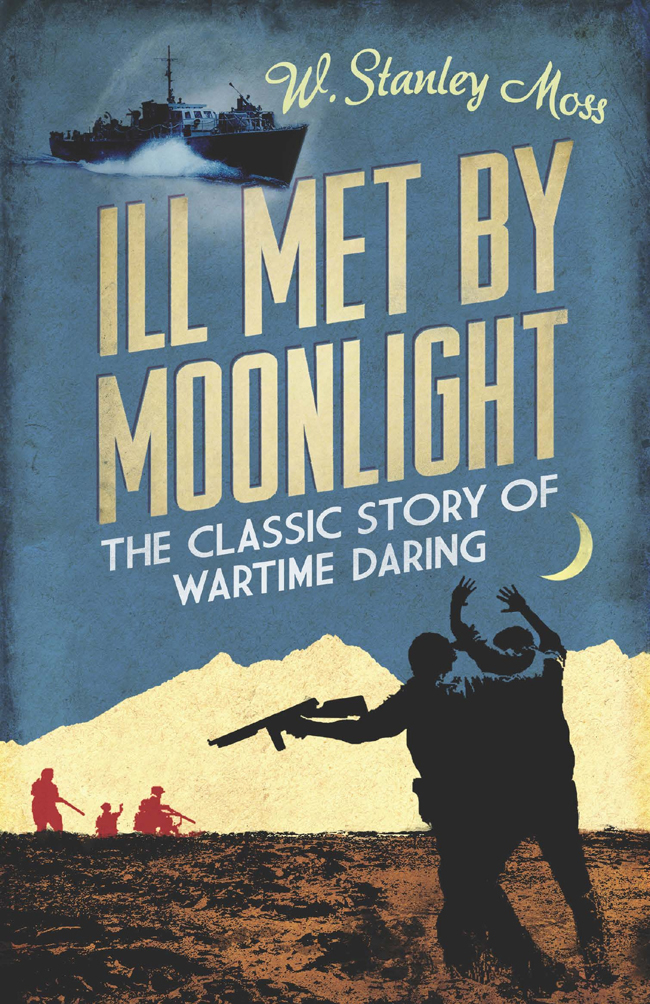W.Stanley Moss - Ill Met By Moonlight: The Classic Story of Wartime Daring
Here you can read online W.Stanley Moss - Ill Met By Moonlight: The Classic Story of Wartime Daring full text of the book (entire story) in english for free. Download pdf and epub, get meaning, cover and reviews about this ebook. publisher: Orion Publishing Group Ltd, genre: Home and family. Description of the work, (preface) as well as reviews are available. Best literature library LitArk.com created for fans of good reading and offers a wide selection of genres:
Romance novel
Science fiction
Adventure
Detective
Science
History
Home and family
Prose
Art
Politics
Computer
Non-fiction
Religion
Business
Children
Humor
Choose a favorite category and find really read worthwhile books. Enjoy immersion in the world of imagination, feel the emotions of the characters or learn something new for yourself, make an fascinating discovery.

- Book:Ill Met By Moonlight: The Classic Story of Wartime Daring
- Author:
- Publisher:Orion Publishing Group Ltd
- Genre:
- Rating:3 / 5
- Favourites:Add to favourites
- Your mark:
- 60
- 1
- 2
- 3
- 4
- 5
Ill Met By Moonlight: The Classic Story of Wartime Daring: summary, description and annotation
We offer to read an annotation, description, summary or preface (depends on what the author of the book "Ill Met By Moonlight: The Classic Story of Wartime Daring" wrote himself). If you haven't found the necessary information about the book — write in the comments, we will try to find it.
Ill Met By Moonlight: The Classic Story of Wartime Daring — read online for free the complete book (whole text) full work
Below is the text of the book, divided by pages. System saving the place of the last page read, allows you to conveniently read the book "Ill Met By Moonlight: The Classic Story of Wartime Daring" online for free, without having to search again every time where you left off. Put a bookmark, and you can go to the page where you finished reading at any time.
Font size:
Interval:
Bookmark:


THE CLASSIC STORY
OF WARTIME DARING

CASSELL
This book is for
SOPHIE
CONTENTS
O N an April night in 1944, a young British officer, my father Billy Moss, was on a small motor launch edging towards the coast of Nazi-occupied Crete, straining to pick out a pinprick of light, the signal to go ashore. A small band of Cretan partisans were waiting, together with Patrick (Paddy) Leigh Fermor, Billys commanding officer. Paddy and Billy were British SOE agents and their mission was to kidnap a German general, spirit him across the island and then across the sea to captivity in Egypt. In his diary, which served as the basis for Ill Met by Moonlight, my father recorded the whole missionone which remains among the most dramatic actions of the war.
The publication of this new edition of Ill Met by Moonlight is a great pleasure for all of my family, and it is an honour to have been asked to write this introduction. For the original 1950 edition, Sir Iain Moncreiffe wrote both a prologue and an epilogue; distilled versions are included here for posterity. They are marvels of their time, as well as being full of incomparable knowledge and insight, and I hold them in the greatest respect and affection.
The afterword was written by Paddy Leigh Fermor in 2001, and we are indebted to The Folio Society for agreeing to it becoming part of Ill Met by Moonlight, as it gives the story an added dimension of enormous importance to Paddy. He wrote from a historical perspective and a wish to set the record straight, to place the missionespecially with regard to his own role in relation to Billysin its true light and context. Billy (who was aged 22) now resembles a sort of Jim Hawkins, from Treasure Island, which was his favourite book; Paddy (then aged 29), Dr. Livesey-like, offers a sober and considered wealth of background detail and information, seeking to dispel misguided notions and to demonstrate that the affair was his idea of long and complex gestation. Paradoxically for one famed for his Peter Pan qualities, Paddy longs for the operation to shed its reputation as a Boys Own kind of adventure and to be taken far more seriously. There is irony in his lamentation that Iain Moncreiffe had a delightfully romantic cast of mind, and in the afterword, he argued his case as best he could. It is so interesting that he chose this forum to revealfor oncethe thoughtful man behind his usual mask. However, as Iain Moncreiffe wrote in 1950, One wireless announcer said, Of all the stories that have come out of the War this is the one which schoolboys everywhere will best remember. In Crete, there is a joke that out of a population of 600,000, 599,999 claimed they were involved. In the words of M. R. D. Foot, it must have sent a frisson of unease through the German High Command. Paddy cannot succeed in stifling the ebullience of this story. Its enduring appeal hinges on a brilliantly successful mix of courage with dare-devilry and on the fact that its aimperhaps uniquelywas not destruction of any kind, but simply, with the co-operation of a huge swathe of the unbowed and complicit population, to get the better of the mighty Germans by stealing their general. It was a wonderful idea.
There was, however, a very serious side to it all, and that is the question of Nazi reprisals against the people of Crete in the summer of 1944, some four months after the abduction. There have been those who predicted such reprisals (such as Sweet-Escott, was executed in Athens in 1947 for these and other war crimes. It was Mller who, having resumed command in July 1944 after a gap of six months, issued the following order for the destruction of Anoyia:
ORDER BY THE GERMAN GENERAL COMMANDER OF THE GARRISON OF CRETE
Because the town of Anogia is the centre of the English Intelligence on Crete, because the people of Anogia committed the murder of the sergeant commander of the Yeni-Gave, as well as of the garrison under his orders, because the people of Anogia carried out the sabotage of Damasta, because in Anogia the guerrillas of the various groups of resistance take refuge and find protection and because it was through Anogia that the kidnappers with General Kreipe passed using Anogia as a transit camp, we order its COMPLETE DESTRUCTION and the execution of every male person of Anogia who would happen to be within the village and around it within a distance of one kilometer.
CHANEA 13TH AUGUST 1944,
THE GENERAL COMMANDER OF THE GARRISON OF CRETE, H. MULLER.
There are others, including Paddy himself, (although he suffered lifelong agonies of doubt, who have maintained that the reprisals were not linked to the abduction and laid the cause on other factors: primarily the Nazis imminent collapse and Mllers strategic need, therefore, to preclude attacks on his withdrawing troops. This he did by crushing all centres of resistance across the island, the so-called scorched-earth policy, and in this way, ordinary German soldiers were compromised by participating in war crimes which made their surrender or desertion impossible. Another factor behind the reprisals was attributed to the attacks by the Communists (ELAS) against German garrisons and outposts in Maya cynical strategy designed to trigger a violent response. In addition, there is the view that upon his return, a vengeful Mller straightforwardly reversed the lenient line which had until then been taken with regard to the bloodless Kreipe abduction.
Then there are thoseperhaps many more, especially in Crete, who are philosophical and stoical, saying that, after all, it was war: yes, the abduction was a factorit was one of several factors behind the reprisals, which had been a ruthless feature of the occupation from its beginning.
Whatever the opinion expressedand everyone in Crete has an opinion on this desperately emotive issueit clearly meant a great deal to people at the time, particularly the andartes, that they were not entirely abandoned after the disastrous outcome of the Battle of Crete in 1941; there is had been broadcast.
And it is also true that nobody could have tried harder than Paddy and Billy to take full responsibility for the kidnap upon themselves, specifically in order to preclude reprisals on the Cretan people so many of whom sheltered, fed and guided them, often at enormous cost, and always at unimaginable risk to themselves and their families without whose protection they would not have survived.
Billy received a long and illuminating letter in 1950. It was from a stranger, Dr. Ludwig Beutin, Professor of History at the University of Hamburg, who in 1944 had been a long-serving officer of the German occupying forces in Crete. It tells the story from the German perspective and as such, provides another fascinating piece of the jigsaw. Having read Ill Met by Moonlight, Dr. Beutin wrote (translated in 1993 by Paddy Leigh Fermor):
General Kreipe arrived in Crete at the beginning of March 1944, replacing Mller. Within a few days he became highly unpopular among the men because of his pettiness and rudeness, to officers as well and he introduced a tone to which the men of the Division were not accustomed and which they perceived as undeserved He always grew impatient at traffic points Every driver actually had to produce a movement-order for every journey in order to stop swanning for fun naturally, no exceptions to this rule were allowed, even for generals; but Kreipe deemed this unnecessary or unbecoming in his own case, and was very rude if his car was ever stopped everyone took care not to examine his car too closely so Kreipe was a victim of his own disobedience to orders
Font size:
Interval:
Bookmark:
Similar books «Ill Met By Moonlight: The Classic Story of Wartime Daring»
Look at similar books to Ill Met By Moonlight: The Classic Story of Wartime Daring. We have selected literature similar in name and meaning in the hope of providing readers with more options to find new, interesting, not yet read works.
Discussion, reviews of the book Ill Met By Moonlight: The Classic Story of Wartime Daring and just readers' own opinions. Leave your comments, write what you think about the work, its meaning or the main characters. Specify what exactly you liked and what you didn't like, and why you think so.












